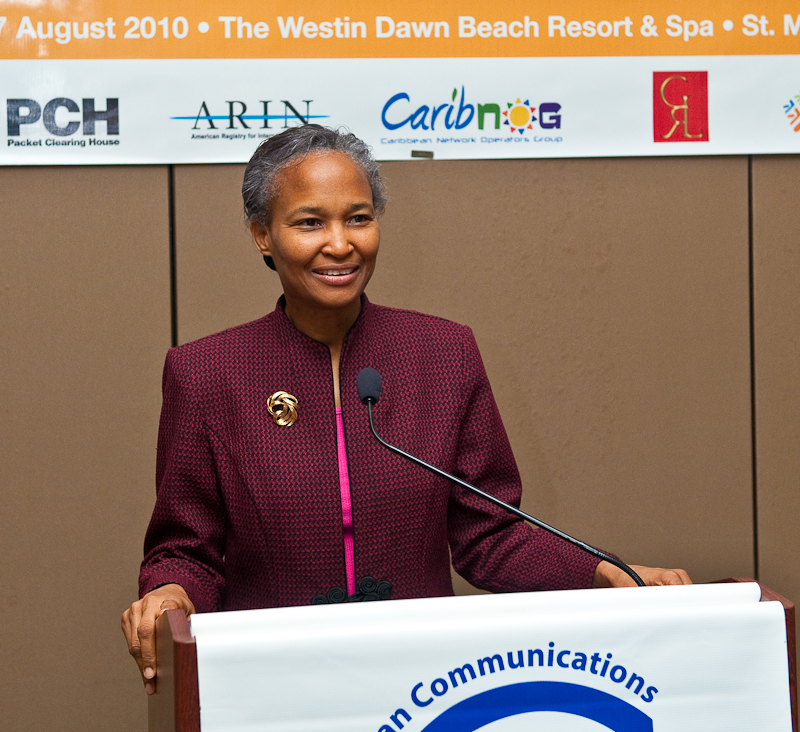Bevil Wooding, Caribbean Technology Ambassador, holds Key to the Internet
Bevil Wooding has been named among seven gatekeepers to restore the Web after disaster These seven gatekeepers, called Trusted Community Representatives (TCRs), have each been given a card with part of a special code that can be used to generate a master Recovery Key which can, in effect, reboot the internet. The seven Recovery Key Share Holders were appointed by Internet domain name watchdog ICANN (The Internet Corporation for Assigned Names and Numbers) in June, and their cards were handed out at a special ceremony at a high-security data centre in Culpeper, Virginia, USA in July.
“This development will fundamentally alter security and business on the Internet,” said Wooding. He explained how his role as a Recovery Key Share Holder intersected with the ‘Domain Name Server Security Extensions’ or DNSSEC protocol which was recently deployed to protect domain names on the Internet.
“DNSSEC makes sure that the website entered into a browser's address bar is what actually shows up in the window. Before DNSSEC, unprotected domains were vulnerable to attacks where a fake page could be used to trick users into accepting viruses or providing personal information for identity theft or fraud. DNSSEC allows websites to use a computer-generated key to verify a site is real, making it harder for such an attack to happen,” Wooding said.
“Financial institutions such as banks and brokerage firms that verify identity will now be able to use DNSSEC to offer more secure connections to their customers. If the DNSSEC system were destroyed or critically damaged, it could shut down these services,” he added.
In the event of a catastrophic security breach, such as a terrorist cyber-attack or a major attack on internet infrastructure, Wooding and his six fellow internet guardians could be called upon to fly to a secure location in the United States where they will combine their respective encrypted fragments of a master Recovery Key in a process that would restore the Internet’s domain name system (DNS) and effectively reboot the web.
This disaster preparedness plan was drawn up by ICANN, a not-for-profit partnership of people from all over the world dedicated to keeping the Internet secure, stable and interoperable.
Wooding downplays the doomsday scenario, stating that he does not anticipate having to be called to use his key. His reserve does not diminish the significant trust that has been placed in him and his new fellowship of Internet guardians. Wooding said that he volunteered to take on the responsibility of holding a key because of his strong conviction that Internet and Internet Governance must always be open and transparent.
The seven key holders were selected from different parts of the world to ensure that a reboot had the involvement of the global Internet community. The seven are: Jiankang Yao (China); Moussa Guebre (Burkina Faso); Ondrej Sury (Czech Republic); Norm Ritchie (Canada), Chief Information Officer of the Canadian Internet Registry; Paul Kane (UK), Chief Executive Officer of CommunityDNS in England; Dan Kaminsky (USA), Chief Scientist at Recursion Ventures in New York City; and Bevil Wooding (Trinidad and Tobago), Chief Knowledge Officer at Congress WBN (C-WBN), a Trinidad-based international non-profit organization.
Wooding effectively represents the Caribbean and Latin America in this elite, global chain of trust.
“It was a privilege to represent the region in such a historic event. Developing countries have a responsibility to ensure that we play our part in defining the systems, policies and the standards that impact, influence and share our future. Business innovation, Government service delivery, national and regional competitiveness, social empowerment and human development are all now inextricably linked to the Internet and access to internet-based technology and systems. Therefore, no single entity or single government should have inordinate control over the operation or function of the Internet. The role and selection of the Trusted Community Representatives was conceived with principle squarely in mind,” he said.
Wooding, who for years has been serving as a de facto Technology Ambassador for the Caribbean by bringing international attention to ICT issues relevant to the region, was the lone representative from the Caribbean to participate in the landmark Internet event. For those who have worked with him, his appointment is no surprise.
“I’ve worked with Bevil on various efforts over the last several years and have always been impressed with his dedication to building Internet infrastructure and the Internet community in the Caribbean. In its search for trusted community representatives, ICANN has certainly found the right man,” said Richard Jimmerson, Chief Information Officer, American Registry for Internet Numbers (ARIN).
A tireless technology evangelist, Wooding works with US-based non-profit research organization, Packet Clearing House to the design capacity building workshops and support critical internet infrastructure for Governments, ISPs, policy-makers, and research communities regionally and internationally.
Bernadette Lewis, Secretary General, Caribbean Telecommunications Union (CTU), said, “His technical expertise, international experience and his clear commitment to regional development make him a unique and invaluable Caribbean resource”.
Wooding is a technology pioneer in the Caribbean, and a strong advocate for the use of Internet technologies in industrializing nations. He has facilitated seminars and workshops on e-government, ICTs and national development and in the US, Africa, Europe and the Caribbean. A tireless technology evangelist, Wooding works with US-based non-profit research organization, Packet Clearing House to the design capacity building workshops and support critical internet infrastructure for Governments, ISPs, policy-makers, and research communities regionally and internationally.
About Bevil Wooding
As Chief Knowledge Officer at Trinidad-based non-profit, Congress WBN (C-WBN), Wooding’s reach extends far beyond his home base. C-WBN operates in over 95 countries, assisting organizations in the private, public and non-profit domain to leverage the power of ICTs. C-WBN is focused on nations-development programs, and Wooding is responsible for technology component of this mandate. An authentic Technology Ambassador, Wooding has been a strong advocate in developing countries for the adoption of Internet and internet-based technologies as a tool for government, corporate and social transformation.
The unique perspective afforded to Wooding through his global responsibilities has made him a sought after resource and speaker. To keep his finger on the evolving pulse-beat of technological change, he continues to work with governments and the private sector to directly shape and direct e-government implementations, information management, business process design and ICT service delivery strategy.
Related News Stories:
Trinidad Express Business Magazine: Trini holds the key to the internet
Trinidad Newsday: Trinidad IT expert represents region in high-level Internet security event
Trinidad Guardian: Trini IT expert represents region at Internet event
BBC News: Trinidad IT specialist on internet security team
CBS News: “Digital Seven” Tasked With Securing the Net in Case of Emergency
ABC News: Brotherhood of the Internet Keys: Who Are the Chosen Seven?



